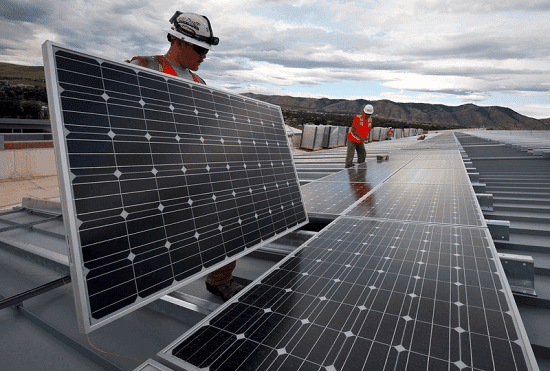Installing Solar Panels: A Guide for Homeowners

When it comes to installing solar panels at home, there are many things to consider, and the process might seem a little complicated.
But the good news is you don’t have to get into the complicated physics of solar energy. All you need to understand is that you can make this project a success with careful planning and budgeting.
So if you’re thinking about going solar, here’s a guide that’ll show you how to successfully install solar panels at home and more!
Read on to learn more.
Understanding the Benefits
Installing solar panels offers many benefits to homeowners. By knowing about these benefits, homeowners will be better able to decide whether to put solar panels on their houses.
Reduced Electricity Bills
Putting up solar panels has many benefits for homeowners, including lowering their energy bills. With the right installation, solar panels can decrease a homeowner’s electricity bills. This depends on the size of the system and the amount of sunlight received.
This is an especially attractive proposition for those living in hotter climates with plenty of direct sunlight. The cost of solar panel installation may be steep initially but is quickly recouped by the energy savings over time.
Before installing solar panels, homeowners should obtain guidance from a professional. Ensure they can provide direction on sizing the system, selecting equipment, and other aspects of the project. By following a professional’s instructions and advice, you can ensure the installation goes well and, in the end, lower your power bills.
Environmentally Friendly
Putting up solar panels is a green way to cut down on carbon emissions and save money on your energy bill. Solar energy is a renewable energy source and a great way to reduce the environmental impact of your home or business.
Before deciding to install solar panels, homeowners need to consider factors such as location and roof angle. Also, the electricity needs of the house and how well the solar panel equipment works need to be taken into account.
By putting up solar panels, homes can help the environment and do their part to cut down on carbon dioxide emissions.
Grid Independence
Installing solar panels is an excellent way for homeowners to increase their grid independence. This means that homeowners can disconnect their homes from the grid and generate their electricity.
As a result, they can reduce their electricity bills and increase the value of their home. Proper planning and research are key to deciding which type of panels are suitable for one’s home and the size of the system. As well as the ways to reduce energy consumption through conservation and efficiency.
Solar panels can also be connected to batteries to store the energy, capturing the power of the sun to use even after the sun has set. Grid independence is possible, and solar panels are the first step.
Increased Property Value
Installing solar panels has many benefits for homeowners, and increasing the value of their homes is one of them. Property values tend to grow with the addition of these panels. They offer an attractive alternative to traditional power sources.
Solar panels are an energy-efficient way to get power. They are also easy to maintain and don’t cost anything to run. Also, many local and state governments have offered incentives and grants to encourage homeowners to go green. This can further increase the value of the home.
Installing solar panels should be considered a worthwhile investment. It not only reduces the cost of energy bills but also adds to the home’s overall value.
Job Creation
Installing solar panels is becoming more and more popular as a way for homeowners to save money on energy. This is while also providing a boost to the economy.
By investing in solar panels, citizens provide job and income opportunities for solar installers. With more jobs available, the unemployment rate decreases, and more money flows back into the system through wages.
Additionally, jobs created to manufacture and deliver solar panels also help to build the economy. As more people choose to install solar panels, attendant job opportunities will increase.
This further provides much-needed income to those in the job market. This job creation is a great benefit to the economy of any country.
Selecting the Right Solar Panels
Choosing the right solar panels can be a complex process, but once you understand what you’re looking for, you’ll have the tools to make the best decision. First, decide the desired wattage of each panel. Start by assessing the energy needs of your home, and then calculate the number of panels needed.
Panels also come in various shapes, sizes, and wattage levels. Consider your space limitations, budget, and environmental goals. Every installation is unique. Select a solar panel design that works for your specific needs.
As a homeowner, researching solar panels can seem overwhelming. But with a little patience, you can find the system that works best for you.
Solar Panel Financing Options
Installing solar panels can save money for homes who want to cut their power bills, but the cost of installing solar panels can be scary. To make solar investment more accessible to homeowners, various financing options are available.
Solar Loans
Solar loans are becoming a more popular way for homes to pay for the installation of solar panels. It is typically repaid over some time, and homeowners can repay the loan with interest.
To secure a loan, homeowners must typically provide some documentation. This includes proof of income and a credit score.
Different types of solar loans are available from both large banks and credit unions. Often the loan amounts are based on the estimated size and cost of their home solar panel installation.
Once approved, the homeowner’s loan agreement will include all the loan details. This consists of the loan duration, APR, and repayment amounts.
With a solar loan, homeowners can enjoy the benefit of solar energy for their homes and make a positive impact on the environment.
Power Purchase Agreement
The Power Purchase Agreement, or PPA, is a way for homeowners to put up solar panels that are becoming more and more common. With this arrangement, the homeowner can buy the energy made by the solar panels from a third party, who also owns and takes care of the system.
This type of agreement is attractive to homeowners. This is because it protects against the possibility that power prices will go up and down and provides a safe, reliable energy source.
With a PPA, homeowners can install solar panels with little to no upfront cost, saving money and helping to reduce their carbon footprint.
Solar Renting
Solar renting can be an attractive alternative to purchasing solar panels outright. It doesn’t require a significant upfront investment. When renting solar panels, property owners don’t install or own the panels.
Instead, a solar company puts its panels on the roof, and the homeowner gets the energy savings instantly. Depending on the company, there could be a variety of requirements, such as a long-term contract or no-penalty early termination. Also, additional incentives like a free or reduced home power audit.
Solar renting may be the best option for homeowners who don’t want to invest or break their lease. Yet wish to benefit from solar energy’s cost savings and environmental advantages.
HELOC
Homeowners who are considering getting solar panels for their homes may be wondering about HELOC financing. HELOC stands for a Home Equity Line of Credit and provides a homeowner with a line of credit based on the amount of equity they have in their home.
This can be a great option to finance the cost of solar panels, as it allows a homeowner to borrow money at an affordable rate. However, it’s important to remember that HELOCs have a variable interest rate. It’s important to research to ensure you are getting the best loan option.
Choosing the Right Solar Panel Installer
Choosing the right solar panel installers is a critical aspect of the home solar installation process. Homeowners need to research the options and ask questions. Ensure they hire an experienced and qualified professional.
When choosing installers, look for those certified by the business and have proof of successful projects. Asking questions such as the types of panels they install and the number of years they have been in the business should also be done. Also, ensure that the worker is covered by liability insurance and follows all safety rules.
Ultimately, the right solar panel provider can make the process easier, help you choose the right size panel, and ensure the job is done right. Check it out for a comprehensive guide to provide a smooth installation process.
The Many Advantages of Installing Solar Panels
Installing solar panels can help homeowners reduce their dependence on grid energy and save substantially on electricity costs. Fortunately, there are many resources available to help navigate the process.
We urge readers to take the time to research their options and to seek professional advice whenever possible. For those ready to make the transition, now is the time to start making the switch to solar energy.
Do you want to find more helpful info? Check out more of our guides on our blog today!






